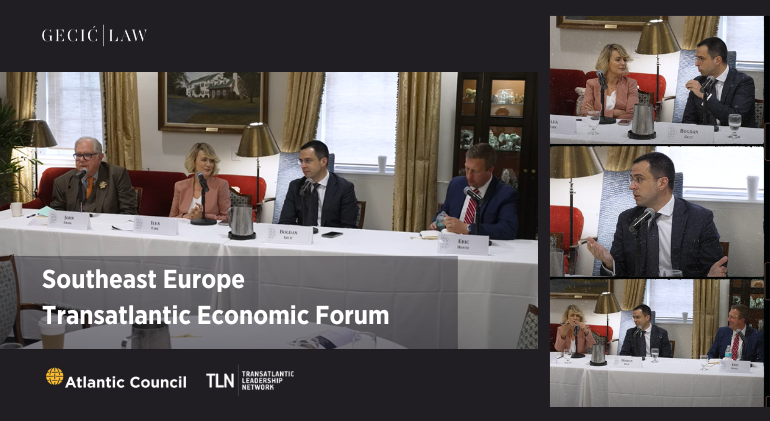

Bogdan Gecić, Founding Partner of Gecić Law, delivered a bold vision for innovation-driven growth in Southeast Europe during a high-profile panel at the Southeast Europe Transatlantic Economic Forum, held May 21, 2025, at the iconic Capitol Hill Club. Co-hosted by the Transatlantic Leadership Network and the Atlantic Council, the Forum convened influential voices from politics, business, and civil society to explore new avenues for transatlantic collaboration and regional development.
Gecić spoke as a featured panelist during the Forum’s culminating session, “Empowering Entrepreneurs: Driving Integration, Convergence and Innovation in Southeast Europe.” Moderated by Ambassador (ret.) John Craig, the discussion also featured Eric Hontz of the Center for International Private Enterprise (CIPE) and Ilva Tare of the Atlantic Council.
In his characteristically candid style, Gecić opened with a provocative stance: “The first thing we should do is nothing.” This remark, aimed at rigid and premature regulation, set the tone for his larger argument—that the Western Balkans has a unique chance to leapfrog into the future by embracing technological agility and innovation.
He warned against importing static legal frameworks, arguing instead that the region’s legal flexibility is a strength, not a weakness. “We don’t need legislation that stifles innovation,” Gecić emphasized. “Right now, we can be faster, nimbler, and more open to experimentation than many other regions”.
Gecić painted an electrifying picture of the region’s technological awakening. He cited the fivefold growth of the tech sector over the past seven years and the presence of world-class talent behind global platforms and leading AI initiatives. “From Belgrade to Tirana, we’re witnessing the birth of mini Silicon Valleys,” he said. “The region is no longer Europe’s periphery—it’s its frontier of innovation.”
He underscored the importance of leveraging this momentum with targeted investments in digital infrastructure and policy frameworks that empower rather than inhibit, drawing attention to the region’s strategic legal positioning for foreign direct investment.
Rejecting the notion that government intervention is the answer, Gecić called for a shift in focus to value creation. “We need less policy and more added value. Entrepreneurs are doing the heavy lifting—governments should catch up,” he remarked.
He also challenged assumptions about regional backwardness, invoking historic examples of Balkan progressiveness such as the opening of the first McDonald’s behind the Iron Curtain—in Belgrade. “We’ve done it before. We can lead again,” he asserted.
Bogdan proposed deeper trade ties with the United States, particularly through sector-specific or comprehensive bilateral agreements. “More free trade with the U.S.—that’s the single most impactful step we can take right now,” he said. He further advocated for U.S.-Western Balkans cooperation in AI and digital industries, where the region holds significant untapped talent and cost advantages.
Bogdan highlighted the lack of U.S. double taxation treaties with many Western Balkan countries. He described these agreements as low-hanging fruit that could certainly unlock a new wave of trade and investment. “These are model agreements—it’s a matter of will, not complexity,” he pointed out.
Addressing concerns about talent flight, Gecić acknowledged past challenges but emphasized emerging trends of return and reintegration. “We are now seeing ‘repats’—those trained abroad—return to seize opportunities back home. The key is prosperity and a vibrant business ecosystem.”
Gecić undoubtedly concluded on a hopeful note: “Small countries have big imagination,” he said, echoing the panel’s recurring theme that Southeast Europe must lean into its entrepreneurial spirit, leverage its unique advantages, and assert itself as a credible partner in shaping the future of the transatlantic community.
“Entrepreneurs are not just economic actors—they are architects of convergence. This is our moment to build a bridge between Southeast Europe and the global innovation economy.”
The Southeast Europe Transatlantic Economic Forum was hosted by the Atlantic Council in cooperation with the Transatlantic Leadership Network. The Atlantic Council is a global affairs institution fostering democratic resilience and transatlantic unity, particularly in support of European integration and regional stability. Transatlantic Leadership Network (TLN) is a nonpartisan think tank advancing North American-European cooperation through research and dialogue, with special focus on Southeast Europe.
Click here to access full video recordings of all sessions from the event, including the above panel.